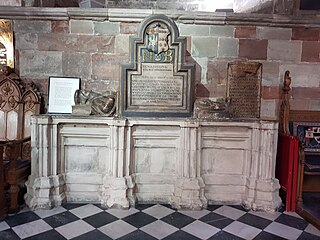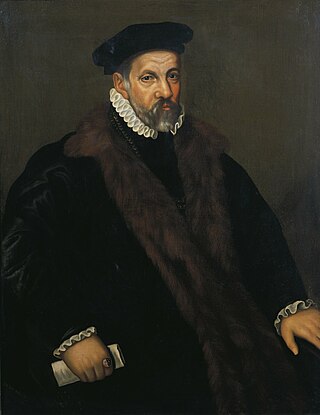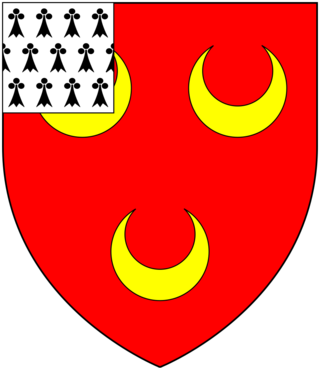
Sir William Dalison (died 1559) was an English judge who served as a Member of Parliament for Lincolnshire in 1553.

Sir William Dalison (died 1559) was an English judge who served as a Member of Parliament for Lincolnshire in 1553.
He was the younger son of William Dalison (d.1546) of Laughton, Lincolnshire, Sheriff of Lincolnshire in 1546 and Escheator of Lincolnshire, by his wife, a daughter of George Wastneys of Haddon, Nottinghamshire.
He entered Gray's Inn in 1534 and was called to the bar in 1537. He was elected Reader of Gray's Inn in 1548 and again in 1552, on one of which occasions he gave a lecture on the statute 32 Hen. 8. c. 33, concerning wrongful disseisin, which is referred to in Dyer's Reports (219 a) as a correct statement of the law. He took the degree of serjeant-at-law in 1552, receiving from his Inn the sum of £5 and a pair of gloves. [1] He served as a Member of Parliament for Lincolnshire in October 1553. [2]
In 1554 he was appointed one of the justices of the County Palatine of Lancaster. In 1556 he was appointed a Justice of the King's Bench and was knighted. His patent was renewed on the accession of Queen Elizabeth I (November 1558).
He married Elizabeth Dighton, a daughter of Robert Dighton of Sturton Parva, Lincolnshire (who survived him and re-married to Sir Francis Ayscough), by whom he had issue four sons and five daughters. His descendants eventually settled in Kent, and were represented in the female line in the 19th century by Maximilian Hammond Dalison of Hamptons, near Tunbridge. [1]
He died in January 1559, and was buried in Lincoln Cathedral. [1]
Dalison compiled a collection of cases decided during the reigns of Edward VI and Philip and Mary (Harley MS 5141). His so-called ‘Reports’ were published in the same volume with some by Serjeant William Benloe in 1689; [3] but the greater portion of those attributed to Dalison were decided after his death. [1] J. H. Baker writing in the Oxford Dictionary of National Biography comments that for the period 1546 to 1558 Dalison's cases are hard to separate from those of Richard Harpur. [4]

Sir Nicholas Bacon was Lord Keeper of the Great Seal during the first half of the reign of Queen Elizabeth I of England. He was the father of the philosopher and statesman Sir Francis Bacon.

William Paget, 1st Baron Paget of Beaudesert, was an English statesman and accountant who held prominent positions in the service of Henry VIII, Edward VI and Mary I.

Sir Anthony St Leger, KG, of Ulcombe and Leeds Castle in Kent, was an English politician and Lord Deputy of Ireland during the Tudor period.

Nicholas Bullingham was an English cleric who became the Bishop of Lincoln and Bishop of Worcester.

Edward Fiennes, or Clinton, 1st Earl of Lincoln KG was an English landowner, peer, and Lord High Admiral. He rendered valuable service to four of the Tudor monarchs.

Sir Richard Southwell PC was an English Privy Councillor.
Sir Roger Cholmeley was Lord Chief Justice of the Court of King's Bench from 1552 to 1553. From 1535 to 1545 he was Recorder of London and served in the House of Commons. He is possibly best remembered for his endowment to found a free grammar school, Highgate School, at London.
Sir Anthony Kingston was an English royal official, holder of various positions under several Tudor monarchs.

Thomas Wilson (1524–1581), Esquire, LL.D., was an English diplomat and judge who served as a privy councillor and Secretary of State (1577–81) to Queen Elizabeth I. He is remembered especially for his Logique (1551) and The Arte of Rhetorique (1553), which have been called "the first complete works on logic and rhetoric in English".

Sir William Cordell of Melford Hall in the parish of Long Melford, Suffolk, was an English lawyer, landowner, administrator and politician who held high offices under both the Catholic Queen Mary I and the Protestant Queen Elizabeth I.
Sir Edward Saunders was an English judge and Chief Justice of the Queen's Bench.
Sir Robert Rede KS was an English Chief Justice of the Common Pleas.
Sir John Baldwin was an English lawyer and chief justice of the Common Pleas.
Sir William Dormer, KB was a Tudor knight, captain and politician.
William Fleetwood was an English lawyer and politician. He was Member of Parliament for Marlborough in 1558, Lancaster in 1559 and 1567, and for the City of London several times between 1572 and 1592, but his most significant position was as Recorder of London from 1571 to 1591. A lawyer of the Middle Temple, he was a Queen's Serjeant in 1592.
Robert Monson was an English politician and judge. He was Member of Parliament for various constituencies from 1553 to 1572 and also became Justice of the Common Pleas.
George Freville, was an English judge and MP.
William Bendlowes (1516–1584) was an English serjeant-at-law and legal writer. He was a Member of the Parliament of England for Helston October 1553, West Looe April 1554, and Dunheved November 1554.

William Dalison of Laughton in the parish of Lindsey, Lincolnshire, was Sheriff of Lincolnshire in 1546 and Escheator of Lincolnshire.

Sir Roger Dalison, 1st Baronet, of Laughton, Lincolnshire was an English courtier, Lieutenant-General of the Ordnance and Member of Parliament.
![]() This article incorporates text from a publication now in the public domain : "Dalison, William". Dictionary of National Biography . London: Smith, Elder & Co. 1885–1900.
This article incorporates text from a publication now in the public domain : "Dalison, William". Dictionary of National Biography . London: Smith, Elder & Co. 1885–1900.